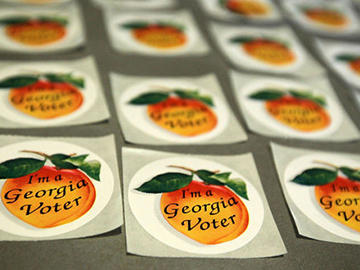
Section Branding
Header Content
The Georgia State Election Board controversy, explained
Primary Content

After keeping a low profile for years, the Georgia State Election Board is facing ethics complaints and a lawsuit.
But, what exactly does the board do, and why is it so controversial?
The SEB's role on paper is to make rules about elections, investigate voter challenges, and ensure local elections officials are doing their jobs. The board can also make recommendations to the legislature for laws concerning elections.
A wide-ranging bill passed by the state legislature in 2021 expanded the board's powers.
The SEB is not a legislative body, nor is it a law enforcement agency. So it can’t arrest elections officials who don’t follow its rules. However, the board can investigate and temporarily suspend elections directors it says are not performing their duties.
Here's a look at what's at issue.
Its members
The secretary of state used to be the presiding member of the board, until moved to an ex-officio position by Senate Bill 202 in 2021. In 2024, the Legislature removed the secretary of state from the board entirely.
John Fervier, a former Waffle House executive, was appointed by Gov. Brian Kemp earlier this year to serve as the chair of the board.
Three of the board’s members — Janelle King, Dr. Janice Johnston, and Rick Jeffares — were called “pitbulls fighting for honesty, transparency, and victory” by former President Donald Trump at his rally in Atlanta in August.
Johnston attended the rally, and stood up while Trump praised her.
While members of the board can be members of a political party, they must act in a nonpartisan manner while serving on the board. Critics say Johnston’s attendance of the rally was a conflict of interest. She did not answer press questions on her attendance.
A controversial July 12 meeting
Allegations of conflicts of interests are not the only controversy the board has found itself in.
On July 12, three members of the board — the same three that have Trump’s stamp of approval — held a meeting to approve new rules. They did not post a meeting notice on the secretary of state’s website, and the meeting was not livestreamed as most meetings are.
Fervier, and Sara Tindall Ghazal, the only Democrat on the board, did not attend the meeting.
Critics were quick to accuse the board members of holding a meeting that violates Georgia’s open meetings act, which requires written or oral notice of a public hearing given 24 hours in advance.
The members of the board agreed to redo the meeting publicly on July 30 and vote again on the rules passed.
A raft of new rules
The board has also faced scrutiny for rules it has passed, which some critics say could delay election certification.
A rule passed Aug. 6 requires county election boards to conduct a "reasonable inquiry" before certifying the results of an election. The word "reasonable" was left undefined.
A rule passed Aug. 19 allows local election officials to request and review an expanded number of documents before certifying an election. Supporters of the rule say more access to documents can give local election boards more confidence in certifying the election, but critics worry it could give some election board members leverage to refuse certification.
Another rule, passed in the same meeting, requires counties to verify vote counts ahead of the deadline for overseas absentee ballots.
The board also voted to open an investigation into the 2020 election in Fulton County, but Attorney General Chris Carr shut down the request, saying that it is not legally possible.
The bipartisan Georgia Association of Voter Registration and Election Officials wrote a letter to the board asking it to stop changing rules so close to the election. They said new rules could confuse poll workers.
County election boards are required by law to certify the election one week after voting ends.
Other legal and ethical complaints
Democrats at the state and national level have accused the board of ethics violations and even violating Georgia law.
State Sen. Nabilah Islam filed a legal complaint in August against the board, and said Johnston, King and Jeffares should be removed for violating the open meetings law and passing rules that could delay certification.
Other prominent Democrats, such as U.S. Rep. Lucy McBath, backed the lawsuit.
On Aug. 26, the state and national Democratic Party filed a lawsuit saying that the rules could delay certification, which would violate the Georgia Constitution. Vice President Kamala Harris’ presidential campaign is backing the lawsuit.
Georgia Republican Party Chair Josh McKoon released statements opposing both the ethics complaint and the lawsuit. He said that the SEB is facing unfair scrutiny, and doing its job to make elections safer.
The board is set to meet again on Sept. 20.

